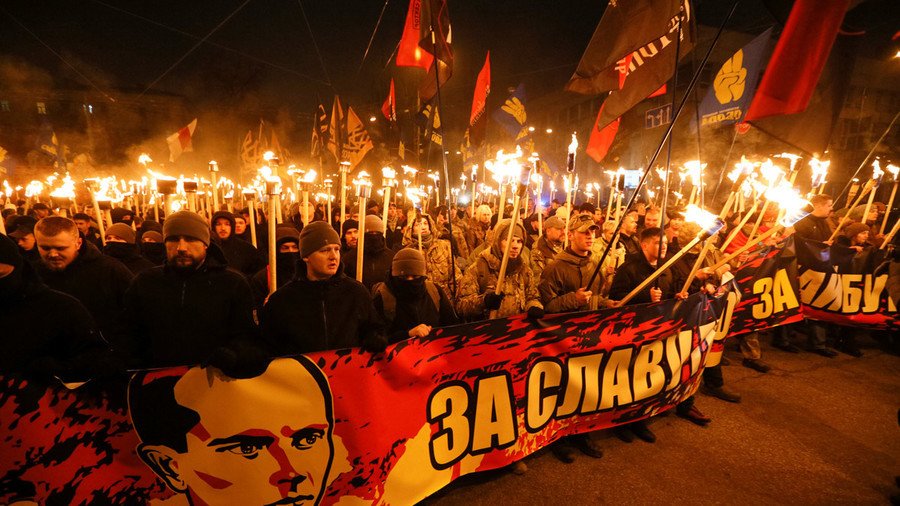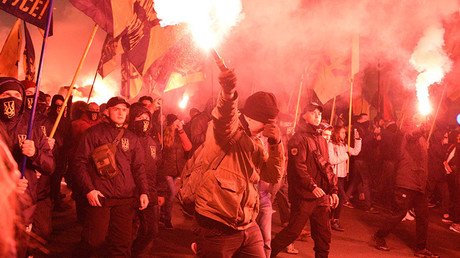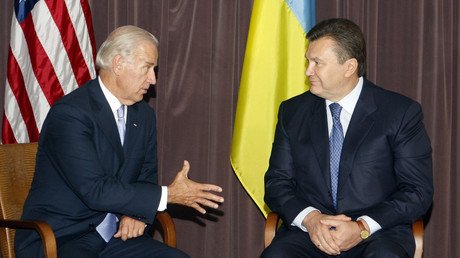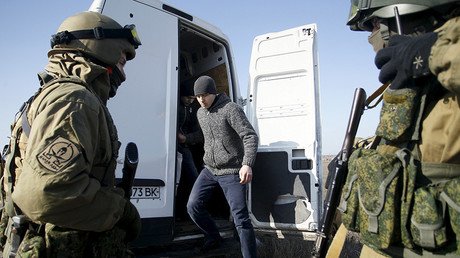Thousands march in Ukraine to mark Nazi collaborator Bandera’s birthday

Some 6,500 people across Ukraine took part in marches on the first day of the year to mark the birthday of Stepan Bandera, a Ukrainian nationalist leader considered a hero in the country despite his dubious and violent methods.
Throughout the country 57 events commemorating Bandera were held, according to police reports. The biggest one in the capital Kiev drew a thousand activists, who marched through city center carrying torches and chanting traditional slogans like “Bandera will come and bring order,” “Ukraine before everything” and “Glory to Ukraine, death to the enemies.” The march was guarded by 1,200 police officers and 730 military service members.
Similar events were held in other Ukrainian cities, from Lvov and Odessa to the small eastern town of Makeevka, which is located mere kilometers from the disengagement line between Ukrainian troops and rebel forces of the self-proclaimed Donetsk and Lugansk People’s Republics. Said republics rejected the 2014 armed coup in Kiev and took up arms partially because the Ukrainian nationalists, who were a major driver of the violence, were perceived as a threat to the predominantly-ethnic-Russian people living in the east. Despite its proximity to the rebels, the Bandera march in Makeevka – the first of its kind – reportedly passed without incident.
The events however were a far cry from similar marches held last year in mid-October, when Ukrainian nationalists mark the day of the Ukrainian Insurgent Army, the paramilitary wing of Bandera’s political force. The rally in Kiev was ten times as numerous as the one on Monday and also featured plenty of anti-government slogans.
Bandera, who was born on January 1, 1909, was a prominent leader of the Organization of Ukrainian Nationalists (UPA), which fought against Poland and Soviet Union for an independent national state for Ukrainians – initially through propaganda and anti-Polish sabotage, later becoming more and more about violence.
Before the German invasion of the Soviet Union the organization aligned itself with the Nazis, hoping that they would help with their cause – only finding out later that Berlin had other plans for both the territory and the people living there. Bandera acted as a German intelligence agent and helped recruit Ukrainian nationalists for Nazi auxiliary units.
Once the organization was no longer useful for the German regime, UPA leaders faced a crackdown. Bandera was arrested in 1941 and spent three years in prison before being released as a potential organizer of resistance to the advancing Soviet troops. The nationalist organization was later backed by the Western intelligence services, which used it the same way the Nazis did – to harm the Soviet control in Ukraine.
Bandera’s personal power, however, dwindled as Ukrainian nationalists succumbed to internal struggles and a shortage of resources, and by the 1950s he and his family had moved to Munich. But his past made him the target of several reported assassination attempts, including a successful one in 1959 when a KGB agent shot him with a cyanide dart gun.
In modern Ukraine Stepan Bandera is honored as a hero – a status which was made official in 2010 when Ukraine’s highest state merit was given to his grandson on the UPA leader’s behalf. Supporters dismiss the more troublesome parts of his biography and claim he had no control over the violence conducted by UPA’s militant wing, which included mass killings of Poles and Jews during the war and a terrorist campaign against Ukrainian Russians loyal to Moscow after the war.
Torch-lit marches in honor of Bandera’s birthday have been organized by the right-wing Svoboda party since 2006.















